- Home
- Liane Moriarty
Husband's Secret Page 11
Husband's Secret Read online
Page 11
Ed had told Janie she wasn’t allowed a serious boyfriend until after she’d finished her very last HSC exam. He’d made such a big deal of it. But Janie hadn’t argued, and Rachel had blithely assumed she wasn’t even that interested in boys yet.
She and Ed met Connor for the first time at Janie’s funeral. He shook Ed’s hand and pressed his cold cheek against Rachel’s. Connor was part of the nightmare, as unreal and wrong as the coffin. Months afterwards Rachel found that one photo of them together at someone’s party. He was laughing at something Janie had said.
And then all those years later, he got the job at St Angela’s. She hadn’t even recognised him until she saw his name on the employment application.
‘I don’t know if you remember me, Mrs Crowley,’ he said to her, a short time after he started, when they were alone together in the office.
‘I remember you,’ she said icily.
‘I still think about Janie,’ he said. ‘All the time.’
She didn’t know what to say. Why do you think of her? Because you killed her?
There was definitely something like guilt in his eyes. She was not imagining it. She’d been working as a school secretary for fifteen years. Connor had the look of a kid sent to the principal’s office. But was it guilt over murder? Or something else?
‘I hope it’s not uncomfortable for you, me working here,’ he’d said.
‘It’s perfectly fine,’ she’d said curtly, and that was the last time they’d ever spoken of it.
She had considered resigning. Working at Janie’s old primary school had always been bittersweet. Girls with skinny Bambi-like legs would streak past her in the playground and she’d catch a glimpse of Janie; on hot summer afternoons she’d watch the mothers picking up their children and remember long ago summers, taking Janie and Rob for ice cream after school; their little faces flushed. Janie had been at high school when she died so Rachel’s memories of St Angela’s weren’t tarnished by her murder. That was until Connor Whitby turned up; roaring his horrible motorbike through Rachel’s soft, sepia-coloured memories.
In the end, she’d stayed out of stubbornness. She enjoyed the work. Why should she be the one to leave? And more importantly, she felt in a strange way that she owed it to Janie to not run away, to face up to this man, every day, and whatever it was he’d done.
If he had killed Janie would he have taken a job at the same place as her mother? Would he have said, ‘I still think about her’?
Rachel opened her eyes and felt that hard ball of fury lodged permanently at the back of her throat, as if she’d not quite choked on something. It was the not knowing. The not fucking knowing.
She added cold water to the bath. It was much too hot.
‘It’s the not knowing,’ a tiny, refined-looking woman had said, at that homicide victims support group she and Ed had gone to a few times, sitting on fold-out chairs in that cold community hall somewhere in Chatswood, holding their styrofoam cups of instant coffee in shaky hands. The woman’s son had been murdered on his way home from cricket practice. Nobody had heard anything. Nobody had seen anything. ‘The not fucking knowing,’ she said.
There was a ripple of soft blinks around the circle. The woman had a sweet, cut-glass voice; it was like hearing the Queen swear.
‘Hate to tell you this, love, but knowing doesn’t help all that much,’ interrupted a stocky red-faced man whose daughter’s murderer had been sentenced to life in prison.
Rachel and Ed had both taken a mutual, violent dislike to the red-faced man, and they’d stopped going to the support group because of him.
People thought that tragedy made you wise, that it automatically elevated you to a higher, spiritual level, but it seemed to Rachel that just the opposite was true. Tragedy made you petty and spiteful. It didn’t give you any great knowledge or insight. She didn’t understand a damned thing about life except that it was arbitrary and cruel, and some people got away with murder, while others made one tiny careless mistake and paid a terrible price.
She held a face washer under the cold tap, folded it and placed it across her forehead as if she was a patient with a fever.
Seven minutes. Her mistake could be measured in minutes.
Marla was the only person who knew. Ed never knew.
Janie had been complaining that she was tired all the time. ‘Do more exercise,’ Rachel kept telling her. ‘Don’t go to bed so late. Eat more!’ She was so skinny and tall. And then she’d started complaining about some vague pain in her lower back. ‘Mum, I seriously think I’ve got glandular fever.’ Rachel had made the appointment with Dr Buckley just so she could tell Janie there was nothing wrong with her and she needed to do all the things that her mother told her.
Janie normally caught the bus and walked home from the Wycombe Road bus stop. The plan was that Rachel would pick her up from the corner down from the high school and take her straight to Dr Buckley’s surgery in Gordon. She’d reminded Janie of the plan that morning.
Except Rachel was seven minutes late, and when she got to the corner, Janie wasn’t waiting. She’d forgotten, Rachel thought, drumming her fingers on the steering wheel. Or she’d got sick of waiting. The child was so impatient, acting as if Rachel was a convenient form of public transport with an obligation to run to schedule. There were no mobile phones in those days. There wasn’t anything Rachel could do, except wait in the car for another ten minutes (she didn’t actually like waiting much herself) before finally going home and ringing Dr Buckley’s receptionist to cancel the appointment.
She wasn’t worried. She was aggravated. Rachel knew there was nothing particularly wrong with Janie. It was typical that Rachel would go to the trouble of making the doctor’s appointment and then Janie wouldn’t bother. It wasn’t until much later, when Rob said, his mouth full of sandwich, ‘Where’s Janie?’ that Rachel looked up at the kitchen clock and felt that first icy thread of fear.
Nobody saw Janie waiting on the corner, or if they did they never came forward. Rachel never knew what difference those seven minutes had made.
What she did eventually learn from the police investigation was that Janie turned up at Connor Whitby’s house at something like three-thirty, and they watched a video together (Nine to Five with Dolly Parton), before Janie said she had something to do in Chatswood and Connor walked her to the railway station. Nobody else ever saw her alive. Nobody remembered seeing her on the train, or anywhere in Chatswood.
Her body was found the next morning by two nine-year-old boys who were riding their BMX bikes through the Wattle Valley Park. They stopped at the playground and found her lying at the bottom of the slide. She had her school blazer placed over her like a blanket, as if to keep her warm, and a pair of rosary beads in her hands. She’d been strangled. ‘Traumatic asphyxiation’ was the cause of death. No signs of a struggle. Nothing to scrape from her fingernails. No usable fingerprints. No hairs. No DNA; Rachel asked the question when she read about cases being solved through DNA testing in the late nineties. No suspects.
‘But where was she going?’ Ed kept asking, as if Rachel would finally remember the answer if he asked the question often enough. ‘Why was she walking through that park?’
Sometimes, after he’d asked her over and over, he’d end up sobbing with rage and frustration. Rachel couldn’t bear it. She wanted nothing to do with his grief. She didn’t want to know about it, or feel it, or share it. Hers was bad enough. How could she cope with carrying his as well?
She wondered now why they couldn’t turn to each other to share their grief. She knew they’d loved each other, but when Janie died, neither of them had been able to bear the sight of each other’s tears. They’d held on to each other the way strangers do in a natural disaster, their bodies stiff, awkwardly patting shoulders. And poor little Rob was caught in the middle, a teenage boy clumsily trying to make everything right, all false smiles and cheery lies. No wonder he became a real estate agent.
The water was too cold now.
Rachel began to shiver uncontrollably, as if she had hypothermia. She put her hands on the sides of the bath and went to stand up.
She couldn’t do it. She was stuck in here for the night. Her arms, her dead-white stick-like arms, had no strength in them. How was it possible that this useless, frail, blue-veined body was the same one that had once been so brown, firm and strong?
‘That’s a good tan for April,’ Toby Murphy had said to her that day. ‘Sunbake, do you, Rachel?’
That’s why she was seven minutes late. She was flirting with Toby Murphy. Toby was married to her friend Jackie. He was a plumber and needed an office assistant. Rachel had gone for an interview and she stayed in Toby’s office for over an hour, flirting. Toby was an incorrigible flirt, and she was wearing the new dress that Marla had convinced her to buy, and Toby kept looking at her bare legs. Rachel would never have been unfaithful to Ed, and Toby adored his wife, so everyone’s marriage vows were safe, but still, he was looking at her legs and she liked it.
Ed wouldn’t have been happy if she’d got the job with Toby. He didn’t know about the interview. Rachel sensed he felt competitive towards Toby, something to do with Toby being a tradie and Ed being a less masculine pharmaceutical salesman. Ed and Toby played tennis together and Ed generally lost. He pretended it didn’t matter but Rachel could tell that it always rankled.
So it was particularly mean of her to enjoy Toby looking at her legs.
Her sins that day had been so trite. Vanity. Self-indulgence. A tiny betrayal of Ed. A tiny betrayal of Jackie Murphy. But maybe those trite little sins were the worst. The person who killed Janie had probably been sick, crazy in the head, whereas Rachel was sane and self-aware, and she knew exactly what she was doing when she let her dress ride a bit further up her knees.
The body wash she’d poured into the bathwater floated on the surface like drops of oil, slimy and greasy. Rachel tried again to heave herself out of the bath and failed.
Maybe it would be easier if she let the water out first.
She let the plug out with her toe, and the roar of the water going down the drain sounded as it always did, like the roar of a dragon. Rob had been terrified of that drain. ‘Raaah!’ Janie used to yell, making her hands into claws. When the water was gone, Rachel turned herself over onto her front. She got onto her hands and knees. Her kneecaps felt like they were being crushed.
She pulled herself to a half-standing position, held on to the side and tentatively put one leg over, then the other. She was out. Her heart settled. Thank God. No broken bones.
Perhaps that was her last ever bath.
She towelled herself dry and pulled her dressing-gown from the hook behind the door. The dressing-gown was made out of beautiful soft fabric. Another thoughtful gift chosen by Lauren. Rachel’s home was filled with thoughtful gifts chosen by Lauren. For example, that chunky vanilla-scented candle in the glass jar, sitting on her bathroom cabinet.
‘Big smelly candle,’ Ed would have called it.
She missed Ed at funny times. Missed arguing with him. Missed sex. They kept having sex after Janie died. They were both surprised by this, and sickened that their bodies still responded the same way as before, but they kept doing it.
She missed them all: her mother, her father, her husband, her daughter. Each absence felt like its own vicious little wound. None of their deaths was fair. Natural causes be damned, Janie’s murderer was responsible for them all.
Don’t you dare, was the strange thought that came into Rachel’s head when she saw Ed crash to his knees in the hallway one hot February morning. She meant, Don’t you dare leave me here to deal with this pain on my own. She knew right away that he was dead. They said it was a massive stroke, but Ed and her parents had died of broken hearts. Only Rachel’s heart had stubbornly refused to do the right thing and kept on beating. It made her feel ashamed, the way her desire for sex had shamed her. She kept breathing, eating, fucking, living, while Janie rotted in the ground.
She ran the palm of her hand across the steamed-up mirror and considered her blurry reflection behind the drops of water. She thought of the way Jacob kissed her with both his fat little hands pressed to her cheeks, his big clear blue eyes staring straight into hers, and each time she’d feel amazed gratitude that her wrinkly face could inspire such adoration.
For something to do, she gently nudged at the chunky candle until it reached the edge of the cabinet, toppled and crashed to the floor in a shatter of vanilla-smelling glass.
chapter fourteen
Cecilia was having sex with her husband. Good sex. Very good sex. Extremely good sex! They were having sex again. Hooray!
‘Oh God,’ said John-Paul from above her, his eyes closed.
‘Oh God,’ said Cecilia agreeably.
It was like there hadn’t been a problem at all. They’d got into bed tonight and turned to each other as naturally as when they were first together as young lovers, back when it was inconceivable that they would ever sleep next to each other without first having sex.
‘Jesus. Christ.’ John-Paul tipped his head back in ecstasy.
Cecilia moaned to let him know she was pretty happy too.
Very. Good. Sex. Very. Good. Sex. She repeated the words in rhythm with the movement of their bodies.
What was that? She strained her ears. Was it one of the girls calling out for her? No. Nothing. Dammit to hell. She’d lost her concentration now. Lose focus for just a moment and that was the end of it. She was back at square one. Tantric sex was the solution, according to Miriam. Now she was thinking about Miriam. So that was the end of that.
‘Oh God, oh God.’ John-Paul appeared to be having no problem maintaining focus.
Gay! Gay, my foot.
The girls, who should have been sound asleep but were only just going to bed (Cecilia’s mother was disobedient when it came to schedules), had been ecstatic to see their father home earlier than anticipated. They’d climbed all over him, talking over the top of each other, telling him about The Biggest Loser, the Berlin Wall, the really stupid thing that Harriet had said at ballet the other day, how much fish Mum had made them eat and so on.
Cecilia had watched John-Paul telling Isabel to turn around so he could admire her new haircut and had noted nothing strange about the way he looked at her. He was exhausted with shadows under his eyes after the long flight (he’d been stuck in Auckland for most of the day, after managing to get an earlier flight home that went via New Zealand), but he seemed happy, pleased with himself for surprising them. He did not seem like a man who cried secret tears in the shower. And now they were having sex! Great sex! Everything was fine. There was nothing to worry about. He hadn’t even mentioned the letter. It couldn’t be that significant if he wasn’t even talking about it.
‘Far . . . out.’
John-Paul shuddered and fell against her.
‘Did you just say far out?’ said Cecilia. ‘You seventies throwback.’
‘Yes, I did,’ said John-Paul. ‘It indicated satisfaction. Speaking of which, I sense that . . .?’
‘I’m fine,’ said Cecilia. ‘It was far out, man.’ It certainly would be next time.
John-Paul laughed, rolled off her and pulled her to him, wrapping his arms around her and kissing her neck.
‘Been a while,’ observed Cecilia neutrally.
‘I know,’ said John-Paul. ‘Why is that? That’s why I came home early. I suddenly got horny as hell.’
‘I spent all of Sister Ursula’s funeral thinking about sex,’ said Cecilia.
‘That’s the way,’ said John-Paul sleepily.
‘A truck driver whistled at me the other day. I’ve still got it, just so you know.’
‘I don’t need a bloody truck driver to tell me my wife’s still got it. You were wearing your gym shorts I bet.’
‘I was.’ She paused. ‘Someone whistled at Isabel the other day in the shops.’
‘Little fucker,’ said John-Paul, but without much heat. ‘She looks much youn
ger with that haircut.’
‘I know. Don’t tell her.’
‘Not stupid.’ He sounded like he was nearly asleep.
Everything was fine. Cecilia felt her breathing start to slow. She closed her eyes.
‘Berlin Wall, eh?’ said John-Paul.
‘Yup.’
‘I was sick to death of the Titanic.’
‘Me too.’
Cecilia let herself start to slide into sleep. Everything back on track. Everything as it should be. So much to do tomorrow.
‘What did you do with that letter?’
Her eyes opened. She looked straight ahead in the darkness.
‘I put it back up in the attic. In one of the shoeboxes.’
It was a lie. A proper black lie sliding as easily from her lips as a white lie about satisfaction with a gift or sex. The letter was in the filing cabinet in the office just down the hallway.
‘Did you open it?’
There was something about the quality of his voice. He was wide awake but he was making his voice sound sleepy and disinterested. She could feel tension emanating from the length of his body like an electrical current.
‘No,’ she said. She made her voice sound sleepy too. ‘You asked me not to . . . so I didn’t.’
His arms around her seemed to soften.
‘Thank you. Feel embarrassed.’
‘Don’t be stupid.’
His breathing slowed. She let hers slow to match his.
She’d lied because she didn’t want to lose the opportunity to read the letter, if and when she chose to read it. It was a real lie that lay between them now. Damn it. She just wanted to forget about the bloody letter.
She was so tired. She would think about it tomorrow.
It was impossible to know how long she’d been asleep when she woke up again, alone in bed. Cecilia squinted at the digital clock. She couldn’t see it without her glasses.
‘John-Paul?’ she said, pushing herself up on her elbows. There was no sound from the ensuite bathroom. Normally he slept like the dead after a long-haul flight.
There was a sound above her head.
She sat up, completely alert, her heart hammering with instant understanding. He was in the attic. He never went in the attic. She’d seen the tiny beads of sweat gathering above his lips when he suffered an attack of claustrophobia. He must want that letter very badly if he was prepared to go up there.
Hadn’t he once said: ‘It would have to be a matter of life or death to get me up there’?
Was the letter a matter of life or death?
Cecilia didn’t hesitate. She got out of bed, walked down the dark hallway, and into the office. She switched on the desk lamp, slid open the top drawer of the filing cabinet and pulled out the red manila folder marked Wills.
She sat down in the leather chair, swivelled it to face the desk and opened the file in the little pool of yellow light created by the desk light.
For my wife, Cecilia Fitzpatrick.
To be opened only in the event of my death.
She opened the top drawer, took out the letter opener.
There were frantic footsteps above her head, a thud as something fell over. He sounded like a crazy man. It occurred to her that for him to be back in Australia now, he must have gone straight to the airport after she called last night.
For Christ’s sake, John-Paul, what in the world is going on?
With one swift, vicious movement, she sliced the envelope open. She pulled out a handwritten letter. For a moment her eyes couldn’t focus. The words danced about in front of her.
our baby girl Isabel
so sorry to leave you with this
given me more happiness than I ever deserved
She forced herself to read it properly. Left to right. Sentence by sentence.
chapter fifteen
Tess woke up suddenly, irretrievably alert. She looked at the clock next to her bed and groaned. It was only eleven-thirty pm. She snapped on the bedside light and lay back on her pillow, staring up at the ceiling.
This was her old bedroom, but there wasn’t anything much left in it to remind her of her childhood. Tess had barely been out the door before her mother had transformed it into an elegant guest bedroom with a good queen-size bed, matching bedside tables and lamps. This was in complete contrast to Auntie Mary, who had reverently kept Felicity’s bedroom exactly as she’d left it. Felicity’s room was like a perfectly preserved archaeological site, with the TV Week posters still on the wall.

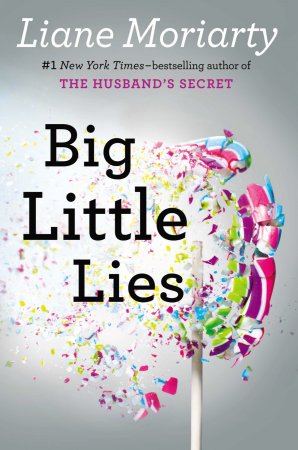 Big Little Lies
Big Little Lies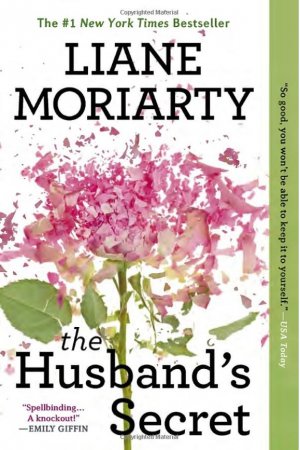 Husband's Secret
Husband's Secret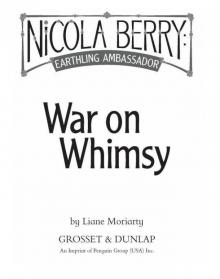 War on Whimsy
War on Whimsy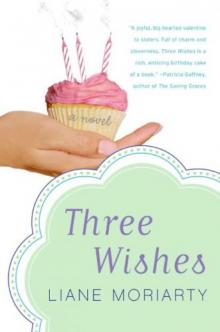 Three Wishes
Three Wishes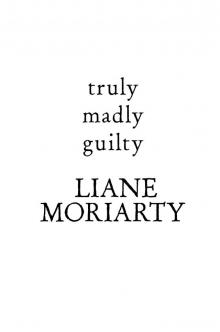 Truly Madly Guilty
Truly Madly Guilty Earthling Ambassador
Earthling Ambassador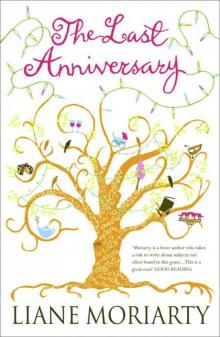 The Last Anniversary
The Last Anniversary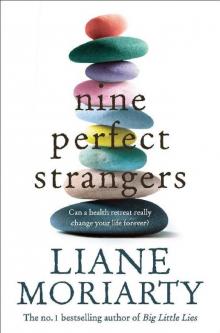 Nine Perfect Strangers
Nine Perfect Strangers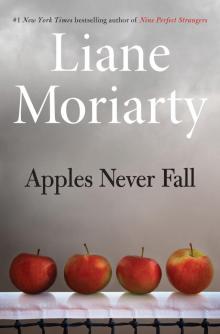 Apples Never Fall
Apples Never Fall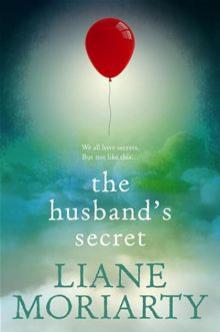 The Husband’s Secret
The Husband’s Secret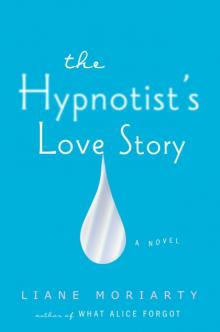 The Hypnotist’s Love Story
The Hypnotist’s Love Story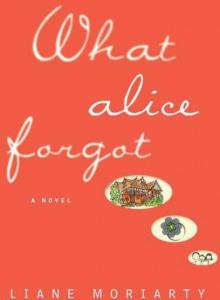 What Alice Forgot
What Alice Forgot